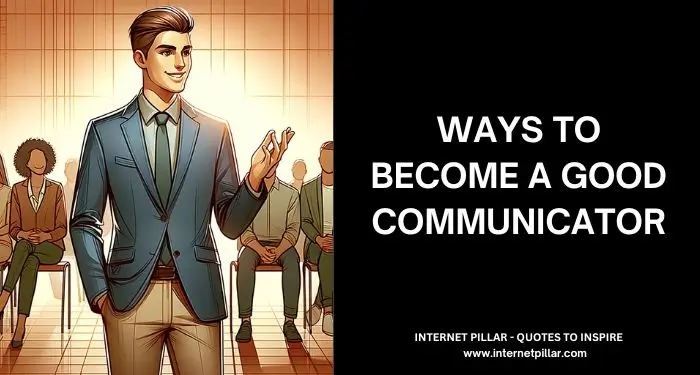Improving your communication skills is key to success whether it’s acing an interview or excelling in your current job.
People who thrive in various settings like work or social gatherings often share one thing: great communication skills.
Success in teams often hinges on having at least one person who communicates effectively.
Good communicators aren’t born that way; they develop their skills through practice and effort.
Being able to express and listen effectively is crucial in all relationships from professional presentations to personal conversations but effective communication can be challenging even though we do it every day.

Life is like an improv show where we constantly make quick decisions without a script.
It’s important to manage emotions during conversations to focus on goals rather than winning arguments.
Good communicators can understand their own and others’ emotions leading to better decision-making. This can improve self-esteem, honesty in relationships and enjoyment in work and life.
Communicating effectively is vital in everything from personal decisions to business.
It’s a challenging skill to master as different situations require different communication styles.
For instance being a great presenter doesn’t automatically make you good at one-on-one conversations and vice versa.
Let’s learn about the 15 best ways to Become a Good Communicator.
15 Ways to Become a Good Communicator
1. Active Listening Skills
Effective communication is not just about speaking but also involves active listening.

This means giving full attention to the speaker showing engagement with cues like nodding and responding with paraphrasing or clarifying questions.
Stephen R. Covey (the famous author) highlights that most people listen with the intent to reply rather than to understand leading to partial listening and missing valuable information.
In the corporate world while loud voices often seem to dominate, true leaders are those who listen attentively before speaking.
2. Clarity and Directness in Communication
Communicating with clarity and directness involves providing specific details and avoiding vagueness.
For instance rather than asking for a response “as soon as possible” specify a deadline. If a message you receive is unclear seek clarification.
Keep communications straightforward avoiding irrelevant details that can confuse or disengage the listener.
While being succinct is important ensure your tone remains friendly and consider whether your contributions are useful to the conversation.
3. Understanding and Using Body Language
Body language is a crucial aspect of communication.

Observe the body language of others to gauge their reactions such as whether they appear bored or engaged.
Similarly be conscious of your own body language. Inconsistencies between what is said and the body language can convey mixed messages.
For effective communication to take place it’s important to align verbal messages with non-verbal cues ensuring both convey the same level of confidence or intent.
4. Know Your Subject
It’s crucial to be well-informed about your topic. For job interviews understand the company and role.
For presentations you should master your subject. This knowledge boosts confidence and communication effectiveness.
5. Maintain Focus
Avoid dredging up past issues during conversations. Whether with colleagues or family concentrate on the current topic.
Start by objectively describing the situation without bias exaggeration or generalization.
6. Frame Your Story Effectively
The way you present a story whether it’s an academic lecture or a personal anecdote significantly impacts its reception.
Find an engaging angle or ‘hook’ and decide on a storytelling approach such as a journey theory explanation or argument.
Build the direction of your story early on.
7. Utilize Open-Ended Questions
Asking open-ended questions enhances likability portrays intelligence and facilitates learning.
Use the Five Ws (What When Where Who Why) and How to encourage detailed responses.
Unlike yes/no questions these invite elaborate answers and stimulate more meaningful conversations.
For example asking “What do you think about the party?” prompts a more insightful response than “Did you like the party?”.
Be genuinely interested in the responses to improve your expression in discussions.
8. Being Pleasant and Approachable
To be engaging maintain eye contact relax your body and smile.
Your tone should be welcoming and clear. Practicing with friends can help refine this.
This approachability encourages others to interact more openly and ask questions leading to better communication and results.
9. Timing Your Conversations
In group settings it’s crucial to speak at the right moment.
Wait for a gap in the conversation to ensure your message is heard completely and without interruption.
This strategy helps in conveying your message effectively to the entire group.
10. Learning from Contextual Communication
Understanding your audience is key. For professional settings like presentations observe others or watch videos of skilled communicators.
In social settings like networking events take cues from those around you. Adapting to the context is a vital communication skill.
11. Practicing Self-Awareness in Communication

Acknowledging and learning from mistakes is a sign of a strong communicator. It’s important to be aware of your reactions in challenging conversations.
If you feel overwhelmed by emotions it’s okay to take a break. This self-awareness helps in reaching effective decisions and maintaining control in discussions.
12. Embrace Being Incorrect
Enhancing communication often means accepting the possibility of being wrong.
Insisting on being right leads to justifying oneself excessively and failing to fully recognize others’ perspectives.
Being open to being wrong breaks down barriers, fosters diverse viewpoints and makes conversations more inclusive and open.
13. Practice Assertiveness
While aggression is celebrated in sports it’s less effective in conversation. Assertiveness unlike aggression involves expressing one’s needs and opinions respectfully.
It’s good as it reduces stress by empowering individuals to decline unnecessary tasks.
In contrast passive individuals often overcommit and aggressive ones fail to communicate effectively causing defensiveness in others.
14. Use Positive Nonverbal Cues
A positive demeanor such as smiling and nodding encourages open communication.

Showing genuine interest in others’ contributions fosters mutual respect and willingness to listen.
Conversely appearing impatient or disinterested can lead to a lack of respect from others.
15. Clarity and Simplicity
Effective communication thrives on simplicity and clarity. When discussing complex ideas minimize jargon and use straightforward language.
Clear communication ensures that your message is easily understood creating a more comfortable and fluid conversation.
Avoid using unnecessarily complex words saving them for more appropriate contexts like novel writing.
I hope these 15 tips will help you in becoming a great communicator.